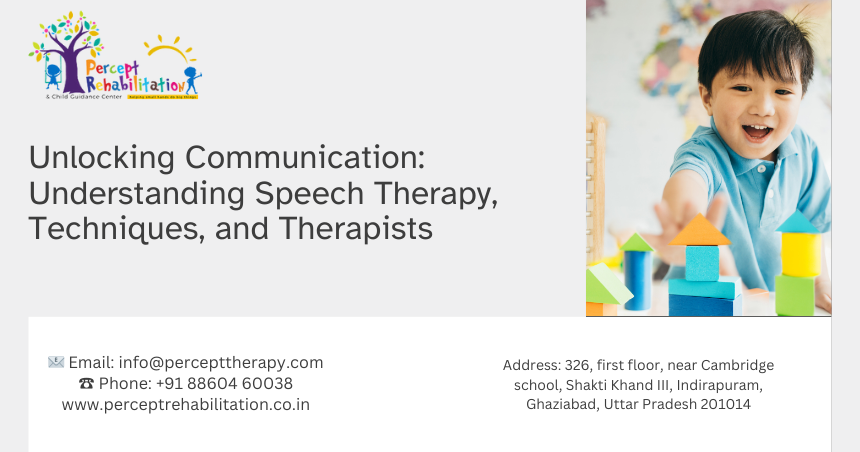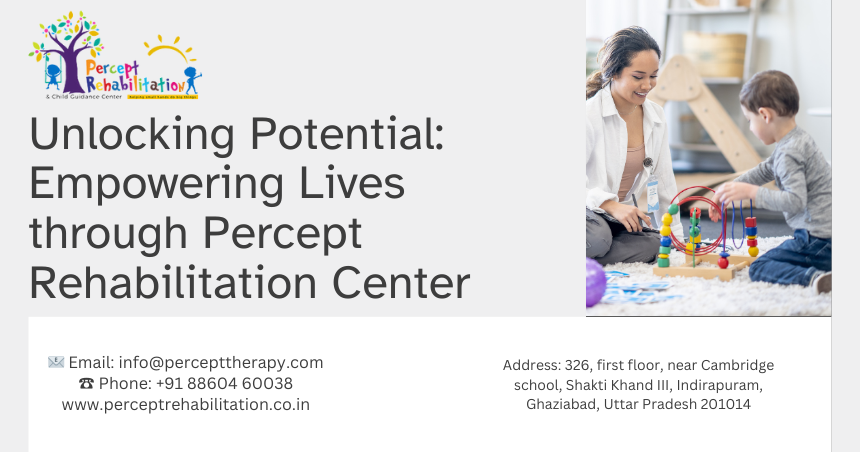Speech therapy is a highly individualized process. No two children progress at the same pace, and timelines can vary significantly. When seeking speech therapy for kids in Indirapuram, many parents at Percept Rehabilitation Centre ask the same question: How long will it take? The answer is both simple and complex — it depends on various interlinked factors, from the child’s age and type of speech challenge to the frequency of sessions and level of parental involvement.
Rather than focusing solely on timelines, it’s more meaningful to look at how therapy is designed, measured, and adapted over time. Below is a detailed breakdown to help professionals, educators, and concerned parents make sense of what to expect from the journey.
The Starting Point: Type and Severity of Speech Disorder
One of the most significant influences on therapy duration is the type and severity of the speech or language issue.
Common Speech and Language Challenges Include:
- Articulation Disorders: Difficulty forming certain sounds.
- Phonological Disorders: Patterns of sound errors.
- Fluency Disorders: Problems such as stuttering or cluttering.
- Receptive Language Issues: Trouble understanding spoken language.
- Expressive Language Issues: Difficulty using words to communicate.
- Pragmatic Language Issues: Challenges with the social aspects of communication.
For example, a child who has trouble pronouncing the “r” sound might need a few months of focused articulation therapy, while a child with a language delay due to a neurological condition may need longer, possibly ongoing, intervention.
Age of the Child at the Start of Therapy
Age plays a critical role in therapy timelines. Early intervention — typically before the age of five — tends to yield quicker and more lasting results. The younger the brain, the more plasticity it has, which means it’s more adaptable to new learning.
- Ages 1-3: Early speech delays can be addressed quickly if caught on time.
- Ages 4-6: Children in this range may show rapid improvement with regular sessions.
- Ages 7 and older: May take longer due to ingrained speech patterns or underlying conditions.
Therapy Frequency and Consistency
Another major factor is how often the child attends therapy sessions. More frequent sessions generally lead to faster results — but only if they’re consistent.
Typical Frequency Options
- Twice a week: Common for moderate issues.
- Once a week: Suitable for mild delays or maintenance.
- Three times a week or more: Often recommended for severe or complex speech disorders.
Consistency is key. Gaps in therapy — due to holidays, illness, or scheduling conflicts — can extend the overall timeline.
Parental Involvement at Home
Therapy doesn’t end when the session does. One of the strongest predictors of success is what happens at home between sessions.
Parent Involvement Can Include:
- Practicing assigned speech exercises daily
- Using target words in routine conversations
- Giving verbal cues or modeling correct speech
- Encouraging verbal expression during play
Children whose parents actively participate in reinforcing speech goals tend to make faster and more consistent progress.
Therapist’s Approach and Customization
No single approach fits every child. A skilled therapist will tailor techniques to match a child’s learning style, age, and specific goals. At Percept Rehabilitation Centre, therapy is customized for each individual, which improves efficiency and helps reduce unnecessary delays.
Some children respond better to play-based sessions, while others thrive in structured, goal-oriented formats. A flexible, evolving treatment plan accelerates outcomes.
Goals and Milestones Matter More Than the Clock
Many parents look for a fixed number — “three months,” “six months,” or “a year.” But timelines in speech therapy are better measured in milestones than in weeks.
Common Speech Therapy Milestones:
- Achieving clear pronunciation of target sounds
- Expanding vocabulary by a specific number of words
- Speaking in complete sentences
- Increasing attention span during conversations
- Reducing stuttering instances per minute
Tracking progress this way keeps expectations realistic and focused on growth, not deadlines.
Individual Factors That Affect Progress
Every child brings a unique set of traits and circumstances. Several individual elements can shape therapy duration:
- Motivation level: Some children engage eagerly; others need more encouragement.
- Cognitive ability: Children with coexisting learning challenges may need integrated therapy.
- Behavioral tendencies: Fidgeting, distraction, or anxiety may slow progress.
- Medical history: Hearing loss, neurological issues, or physical impairments can complicate treatment.
Therapy isn’t linear. Progress may be fast at first, slow in the middle, and then accelerate again.
When Will It End? Setting Expectations
One of the most important roles a therapist plays is helping families set realistic expectations.
- Some children may graduate from therapy in 3 to 6 months.
- Others may need 1 to 2 years, especially in cases of developmental delay.
- For conditions like autism spectrum disorder, speech therapy may continue alongside other interventions over many years.
Rather than focusing on how long, the focus should be on how much progress is being made. Regular reassessments, typically every 3-6 months, help determine if therapy goals are being met and if frequency or strategies should be adjusted.
How Long is a Session?
Each session typically lasts 30 to 60 minutes, depending on the child’s age and needs. For young children, 30-minute sessions are more common, while older children can tolerate longer, more detailed work.
The ideal duration balances intensity with attention span. Too short and there’s not enough practice. Too long and fatigue sets in.
Signs That Therapy Is Working
You’ll know therapy is effective when you observe changes — both small and large — in daily life.
Look for Signs Like
- Fewer instances of frustration while speaking
- Improved clarity in pronunciation
- More confidence in initiating conversations
- Expanded vocabulary
- Better listening and comprehension skills
Therapy doesn’t just help with speech; it builds confidence and improves overall communication.
The Role of School and Peer Interaction
School environments play a big role in supporting or hindering progress. Regular classroom participation, peer interaction, and teacher cooperation can all influence how fast children improve.
Many therapists collaborate with schools to align strategies and ensure reinforcement across environments.
When to Take a Break — And When Not To
Sometimes, families consider pausing therapy due to cost, scheduling, or lack of visible progress. However, breaks can disrupt the rhythm and lead to regression.
A planned break, guided by the therapist, is different from a pause driven by uncertainty. Always consult your child’s speech-language pathologist before deciding.
Factors That May Extend Therapy Timelines
Several circumstances can make therapy last longer than initially anticipated.
- Multiple speech or language disorders
- Comorbid conditions like ADHD or autism
- Inconsistent attendance
- Lack of follow-through at home
- Emotional or behavioral issues
Rather than viewing extended timelines as a failure, consider them as part of a deeper, more complex journey.
Success Isn’t Always Linear
It’s normal for progress to fluctuate. Children may:
- Plateau temporarily
- Take two steps forward, one step back
- Progress rapidly after a breakthrough
Therapists adjust goals, techniques, and pacing based on these variations.
How Percept Rehabilitation Centre Supports Progress?
At Percept Rehabilitation Centre, located in Indirapuram, the focus is not on how quickly therapy ends — but on how effectively it empowers each child. Our team uses individualized therapy plans that include parent involvement, regular milestone tracking, school collaboration, and evidence-based techniques to ensure progress is both steady and meaningful.
Why Choose Percept Rehabilitation Centre?
- Personalized Plans: Therapy is tailored to your child’s unique needs and learning style.
- Qualified Specialists: All sessions are handled by certified, experienced speech-language pathologists.
- Collaborative Approach: We actively involve parents, educators, and caregivers in the therapy process.
- Modern Facilities: Equipped with child-friendly tools, toys, and interactive learning aids.
- Transparent Reporting: Regular assessments help you stay informed about your child’s growth.
Percept Rehabilitation Centre remains committed to helping every child find their voice — not just faster, but stronger, clearer, and with greater confidence.


